 Petzlover
Petzlover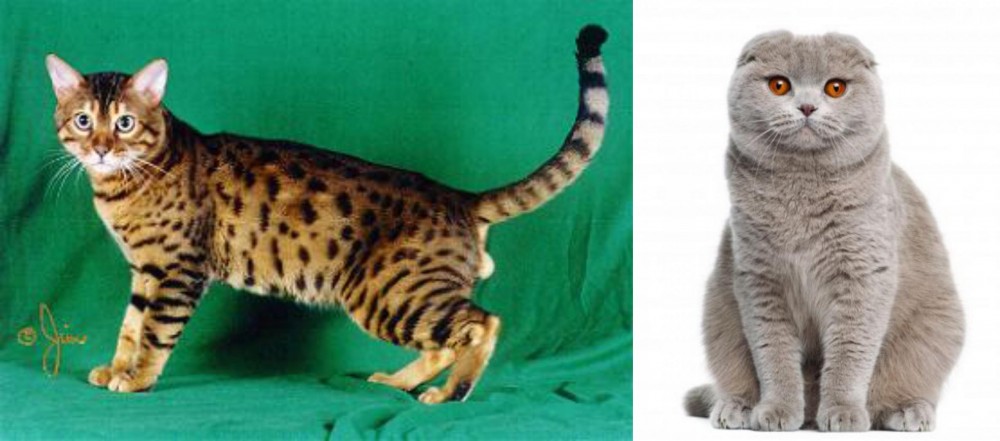 Bristol is originated from United States but Scottish Fold is originated from United Kingdom. Both Bristol and Scottish Fold are having almost same weight. Bristol may live 5 years more than Scottish Fold. Both Bristol and Scottish Fold has same litter size. Both Bristol and Scottish Fold requires Low Maintenance.
Bristol is originated from United States but Scottish Fold is originated from United Kingdom. Both Bristol and Scottish Fold are having almost same weight. Bristol may live 5 years more than Scottish Fold. Both Bristol and Scottish Fold has same litter size. Both Bristol and Scottish Fold requires Low Maintenance.
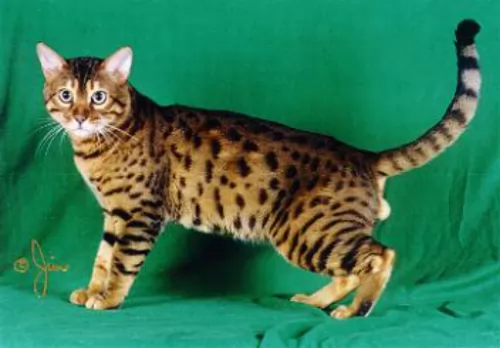 The Bristol cat hails from Texas and was developed during the 1980s, using a south American wild cat and domestic cats.
The Bristol cat hails from Texas and was developed during the 1980s, using a south American wild cat and domestic cats.
The Bristol cat isn’t well-known and in fact, its origins are shrouded in mystery.
The cat was recognized and admitted into the TICA (The International Cat Association. It is looked upon as a hybrid breed or a designer cat.
Nobody seems to know when the first Bristol cat was even bred. Because of its exotic nature, it is believed to be a cross between the American Shorthair and the margay or similar breed.
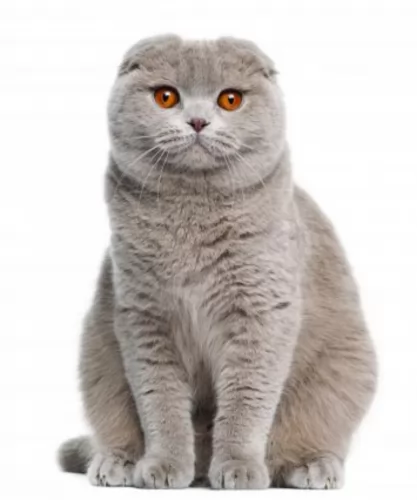 The Scottish Fold is a domestic cat that has an owlish look to it. This is because of the natural dominant-gene mutation that affects cartilage in the cat.
The Scottish Fold is a domestic cat that has an owlish look to it. This is because of the natural dominant-gene mutation that affects cartilage in the cat.
The ears of the Scottish Fold cat folds in a weird way so that the cat has an owl-like look to it. These cats are also known as Highland Fold and Coupari.
It seems that the first Scottish Fold was a white barn cat with the name of Susie. When Susie had kittens, there were a couple of them born with these folded ears. A cat fancier registered the breed in the United Kingdom and in 1966 started a breeding program. These cats were later exported to America.
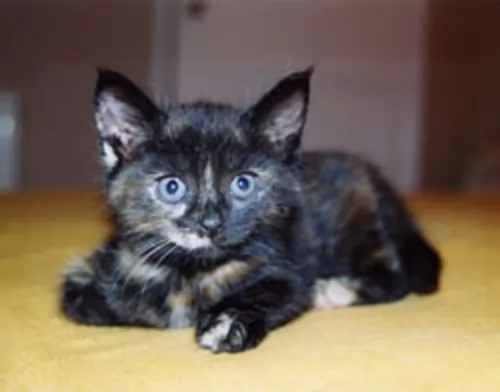 Bristol cats are medium-sized and muscular, powerful cats. They are much like Bengal cats. They have a smokey charcoal appearance while others have quite a bit of white on them.
Bristol cats are medium-sized and muscular, powerful cats. They are much like Bengal cats. They have a smokey charcoal appearance while others have quite a bit of white on them.
They also have rosettes and small rounded ears. The origins of the Bristol breed are uncertain but it seems a multi-colored cat was adopted by a United States Army captain in Australia.
The cat was so adored it was brought back when they returned to the United States. The cat was already pregnant and she gave birth to 2 kittens. The coats are shiny and short-haired with spots and lines of fawn, grey and brown mostly with the eyes being green.
The Bristol cat has a very pleasing disposition – being amicable, playful, and loving. They’re intelligent cats too but they need to spend time in solitude as well.
They definitely don’t respond and bond to everyone in the human family but tend to respond to only one person.
These Bristol cats are cunning and self-confident and because of their wild side, they will need a large area to roam. This is definitely not a cat for city life.
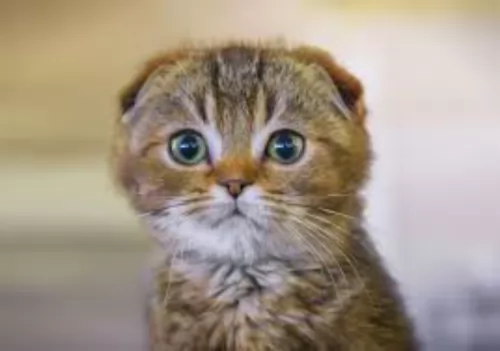 This is a medium-sized cat that weighs between 3 and 6kg. The entire body of this cat is of a rounded nature. The legs are also fairly short.
This is a medium-sized cat that weighs between 3 and 6kg. The entire body of this cat is of a rounded nature. The legs are also fairly short.
All Scottish Fold kittens are born with regular ears but within the first few weeks after birth, the peculiarity with the ears starts to come in. However, some kittens don’t develop folded ears.
The first cats had one fold but with selective breeding, some have 2 or 3 folds or creases so that the ears lie flat against the head. The cat has a round head and large, round eyes. These cats can have a long- or short coat which is thick and soft and the coat can be in a number of colors.
Your Scottish Fold is a good-natured, placid cat and adapts well to different homes and lifestyles. He gets on well with children and pets, becoming just a little bit more attached to the one who feeds him.
He ‘talks’ with quiet meows and purs. They’re playful cats and love to spend time outdoors. A climbing tree and stimulating toys will be a good idea for this energetic feline as he is active and curious. He won’t like being left for long periods though.
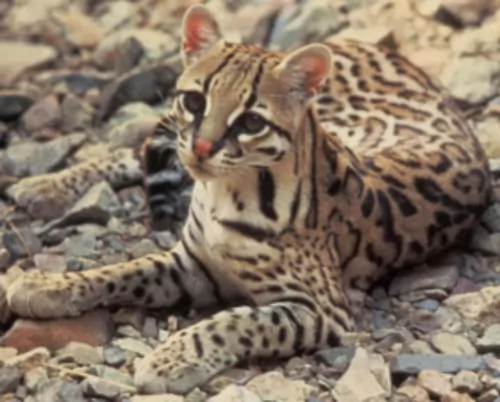 The Bristol cat is beautiful all right, but once again humans should just leave wild cats alone in the bush.
The Bristol cat is beautiful all right, but once again humans should just leave wild cats alone in the bush.
Mixing them with domestic cats doesn’t work in the long run, and many of these cats land up in shelters because of unruly behavior. The Bristol cat is part wild and it doesn’t seem to have a future although there isn’ enough information online to really know what its future is.
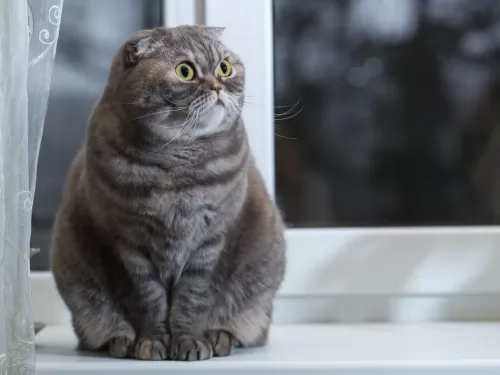 With his big, round eyes, the Scottish Fold has an amicable looking face and he is a friendly calm cat.
With his big, round eyes, the Scottish Fold has an amicable looking face and he is a friendly calm cat.
They love attention and get on well with children and pets who have been trained to be gentle around cats. It is also quite a vocal breed although he 'talks' in a quiet voice.
Because they thrive on pampering and attention, it is better for this cat not to be in a home where the owners are away at work all day.
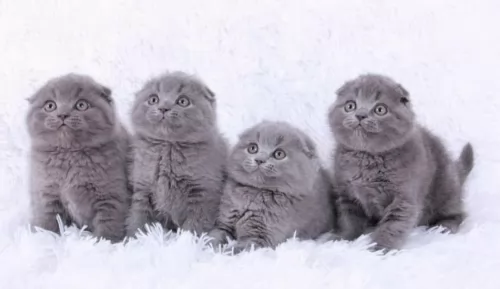 Perhaps one of the things to look out for with these cats is a disease known as osteochondrodysplasia.
Perhaps one of the things to look out for with these cats is a disease known as osteochondrodysplasia.
This is a hereditary disorder of the bones and cartilage. The disease is caused by an autosomal dominant trait and a cat can inherit just one copy of the abnormal gene to have the disease.
Having this disease comes with other health issues and a cat with this disease will be reluctant to jump and may even become lame.
Whenever you suspect anything wrong with your Scottish Fold cat, get him to the vet just as soon as possible.
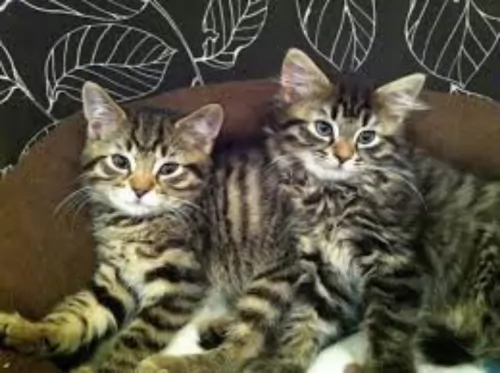 The diet of a cat such as the Bristol will include small rodents, however once domesticated, these cats will need a diet high in protein. The cat is a carnivore and to be healthy it will require high-quality premium commercial cat food that is appropriate for the age of your cat and his health status.
The diet of a cat such as the Bristol will include small rodents, however once domesticated, these cats will need a diet high in protein. The cat is a carnivore and to be healthy it will require high-quality premium commercial cat food that is appropriate for the age of your cat and his health status.
The best cat food has taurine in it, an essential protein that cats can only obtain through quality food. Your adult Bristol cat may prefer eating several smaller meals and this is actually a good idea as smaller frequent meals help towards greater urinary tract health.
If you want a healthy cat, you have to be diligent with providing such a cat with good food that is high in protein. If you aren’t sure, your veterinarian will be able to advise you on what to feed your new cat or kitten.
Factors such as age, size, activity levels, and health make a difference to what you feed your cat, how much and how frequently.
Get into a habit of reading and understanding the labels on the cat food packaging. Certainly, every cat requires taurine, an essential amino acid. You will also need to ensure fresh, cool water day and night.
Always take your pet to the veterinarian if he is lethargic ad disinterested in his food.
Most cats are clean, but you should brush or comb your Bristol cat regularly as the brushing helps keep your cat's coat shiny and also reduces the amount of hair during shedding.
Provide your Bristol cat with a dry, warm sleeping area and keep the bedding clean.
Your Bristol cat needs to wear a safety collar and an ID tag. These ID tags or an implanted microchip can help ensure that your Bristol cat is returned if he becomes lost.
Cats scratch, and cutting your cat’s nails will keep the nails blunt. Nonetheless, to prevent your furniture from being scratched, provide your cat with a strong scratching post covered with a rough material such as sisal or tree bark.
Bristol cats are independent and they don’t require any kind of special care. Certainly, they require large areas for their active lifestyle as well as a shallow pool for swimming.
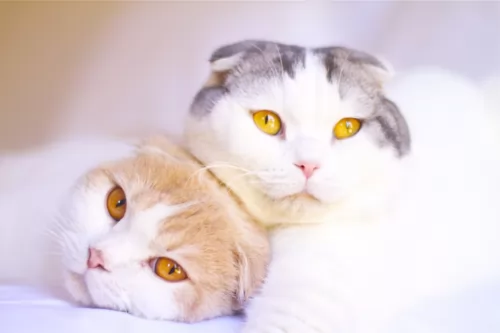 Scottish folds have thick fur and you should at least brush it once a week to get rid of dust and loose hair.
Scottish folds have thick fur and you should at least brush it once a week to get rid of dust and loose hair.
Keep your cat’s nails trimmed otherwise you could get a nasty scratch.
Provide your cat with a climbing tree as well as a scratching post as these are two things – climbing and scratching – that are in the nature of cats.
Provide your Scottish Fold with a litter box and make sure that it is kept clean and that you remove the feces every single day.
Provide your pet with stimulating toys as they are active, intelligent cats.
Protect your cat from fatal cat diseases by having him vaccinated. Your vet will inform you about which vaccines are best. Kittens need vaccines when they are between 6 to 8 weeks old These vaccines come in a series but you don’t have to stress, as the vet will give you a card with the date on which your kitten must return for his next vaccine.
Your Scottish Fold needs to receive the highest quality cat food there is as these foods are balanced with the right amount of vitamins and minerals. When it comes to commercial cat foods, you’ve got choices. You can choose wet or dry food or even combination – something to tempt the fussiest of cats. Cats are carnivores and their food needs to be almost entirely of meat.